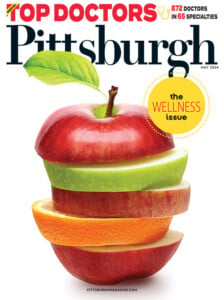Book Review: The Workaday Speech of the Service Industry
Using the language of line cooks and dishwashers, Fred Shaw publishes his first poetry collection.

The title of Fred Shaw’s debut poetry collection, Argot, refers to that specialized vocabulary used by particular social groups. It’s a way of talking about ourselves without being explicit. In other words, the way we talk, the very language that we use, marks us as belonging to a particular community. Pittsburghese is a good example. If you’re visiting Ireland, say, and you overhear someone in the pub say “yinz,” “worsh” and “redd up,” you immediately know there’s a yinzer in the house.
Shaw teaches writing and literature at Point Park and Carlow universities, but like many folks teaching in universities, he’s had to pick up other work to make ends meet. He’s spent a lot of time in the service industry, and the poems in this collection reflect those experiences. The language we use on the job marks us as much as any uniform, and in these poems the workaday speech of line cooks and dishwashers is the signature sound:
In the sweaty restaurant kitchen,
where I’ll learn to cuss in Mexican,
tattooed line-cooks talk s—
in voices
nicked as the bone-white
monkey bowls we stack and fill.
Shaw fills his poems with the stuff of the workplace: recycling bins, Aquafina bottles, a dropped plate of scallops. It’s the accretion of detail, which creates a lived-in world on the page. Shaw’s exhausted restaurant workers sweating in kitchens while Perry Como sings overhead feel distinctly real.
Perhaps the finest work in this collection is a series of poems about the author’s father. Elsewhere in these pages are youthful remembrances of punk shows at the Electric Banana, fist fights and the discovery of sex aided by “a spongy copy of Penthouse / stashed in the woods.” But in these emotionally resonant poems about his father, Shaw lets his guard down and reveals himself more fully to the reader.

Lori Jakiela also is concerned with how we create our identities and the language we use to define who we are. In Jakiela’s case, that is as a child of adoption. Belief Is Its Own Kind of Truth, Maybe is Jakiela’s third memoir and her finest work to date.
This is the story of Jakiela’s search for her birth mother. It is, as is so often the case with the author’s work, at once harrowing, hilarious and cry-yourself-to-sleep sad. What does it mean to be a mother? What does it mean to be someone’s child? This is the onion Jakiela attempts to unravel as she tries to understand the mother who gave her away. The search for her lost family brings with it a deeper appreciation for her adoptive parents.
Lori Jakiela is one of our very finest local writers, and her books are wonderful gifts. If you haven’t yet read her, do yourself the favor of starting right here.

Upcoming readings:
Pittsburgh Poetry Collective/ The Pittsburgh Poetry Collective is an organization with a deep commitment to self-expression, social justice and the exploration of identity. It’s also the home of Steel City Slam, the popular weekly event featuring the city’s finest spoken-word artists.
Slams are a great big blender of classical poetry, hip-hop, political speech and performance art all whipped together in the shape of a game show. For the 13-to-19-year-old bracket, there’s Young Steel, a writing workshop and open mic. This is a great place for the precocious budding wordsmith to get his or her start.
[Steel City Slam: Capri Pizzeria & Bar, 6001 Penn Ave., East Liberty, Tuesdays; Young Steel: Carnegie Library of Pittsburgh, East Liberty Branch, 130 S. Whitfield St., first Wednesday of every month, pghpoetry.org]
Poetry and prose readings/ Squirrel Hill’s Te Cafe is a fine place to unwind with a flavorful brew and a great book. Now, it’s also a great place to hear live poetry and prose. Readings are family-friendly, so bring along the kiddies. [2000 Murray Ave., 412/422-8888, second Wednesday of every month]

